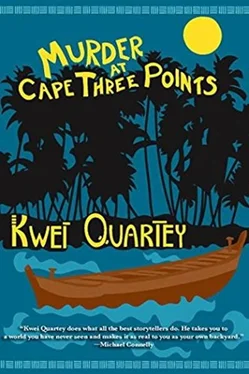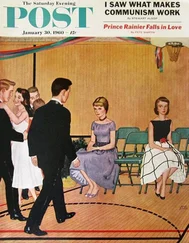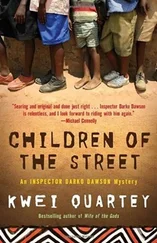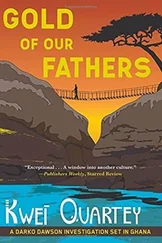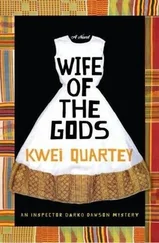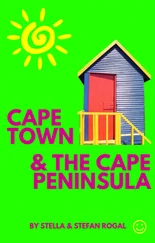Cardiman looked from Dawson to Chikata and back. “You follow? Okay, the opposition party comes into power four or eight years later, parliament defunds the project and it collapses. In the end, Malgam gains beachfront property to develop, they’ve paid a sum of money that’s a drop in the bucket for them, the government hasn’t spent that much either, and the people of Akwidaa are left with a less than half-finished village with reduced access to the shore, no electricity, and one lousy community tap.”
“So now that Charles Smith-Aidoo is dead, a scheme like that is also dead?” Dawson asked.
“Oh, yes-for now,” Cardiman said with undisguised satisfaction. “Not that I’m glad Charles is dead, but there you have it. The new man, Jason Sarbah, is not keen on all this development stuff, but don’t be surprised if it all resurfaces at some point.”
“What happened that day Charles and his wife came to visit you?”
Cardiman sighed, rested his palms on his knees, and collected himself for the account. “They arrived around eleven. Charles mentioned that they had come from a meeting in Axim that morning. Fiona sat at the beachside while Charles and I talked in the restaurant. He offered me a stake in a development along the Cape Three Points shoreline, including the Ezile Bay and Akwidaa locations. He showed me the plan, the expected revenue, the environmental impact assessment, and so on. And I said no. Full stop. No. I said I didn’t want to lose this place at the hands of some faceless moneymaking venture. I don’t operate this resort for money-in fact, I don’t make much money from it at all. I do it for the love of it.”
“What did Smith-Aidoo say to your answer?” Dawson asked.
“He accepted it, and we more or less left it at that. I had lunch with him and Fiona, and we parted on amicable terms.” Cardiman smiled. “Look, I’m no fool, Inspector. I know you’re looking for a murderer and that I was one of the last persons to see the Smith-Aidoos alive. So, yes, I accept that I could be a suspect, but let me assure you of one thing: Although Charles and I had fundamental disagreements in outlook, I did not hate the man. In fact he was really a nice, personable chap.”
Dawson shook his head. That wasn’t good enough. “It’s not a matter of hate, Mr. Cardiman, it’s rather his threatening the way of life you love. This place represents your very reason for living in Ghana, or am I wrong?”
“You are not, and I appreciate your clarity of perception, but…”
“Let’s go over this again,” Dawson interrupted, dissatisfied with the way the discussion was going. From the corner of his eye, he saw Chikata carefully watching Cardiman. “What time did Charles and Fiona leave Ezile Bay?”
“Around twelve thirty. I was due in Takoradi that afternoon, so I left at about one. I came across their vehicle at the roadside about twenty or twenty-five minutes later. The front doors were wide open. I took a look inside the vehicle without touching anything, I looked around, called out their names several times, but nothing.”
“Did you see anyone in the vicinity or any sign of another vehicle?” Chikata chimed in, to Dawson’s approval. He wanted more of that from his sergeant.
“No one and nothing,” Cardiman said firmly. “It’s not a highly traveled road, as you yourself must have noticed on your way in. It’s usually several miles before you see anyone else either in a car or on foot, and for the most part that’s near the two or three villages along the way-women carrying firewood and so on.”
Which makes it a very convenient place to kill someone , Dawson thought. “Do you own any firearms, Mr. Cardiman?”
“No!” He looked baffled. “Come on, Inspector. I didn’t kill the man any more than you did. How could I have ambushed their vehicle if they left at twelve thirty, and I left almost thirty minutes later? By that time, they would have been close to the Agona Junction. I couldn’t possibly have caught up with them.”
Dawson admitted to himself that Cardiman was right. He took a few minutes to jot down notes in his book and then looked at Chikata. “Did you have any more questions?”
The sergeant shook his head.
“Would you do us a favor, Mr. Cardiman?” Dawson said. “We’d like go to the spot you discovered the Smith-Aidoos’ Hyundai and look around a little bit.”
“Certainly. I can drive you there right away.”
DAWSON OBSERVED THAT RESORT ownership must not have been treating Cardiman too badly. He owned a late edition Land Rover SUV, which he drove at breakneck speed. Dawson sat beside him with Chikata in the rear.
“I know every centimeter of this road,” Cardiman said, swerving violently to avoid a pothole. “At the height of the rainy season when everything turns to mud, it’s bloody awful.”
“Is this the only route to and from Ezile by car?” Dawson asked him.
“The only civilized way, so to speak.”
They passed a creek into which several laughing kids were jumping from the bridge overpass. The children waved and cheered as the Land Rover sped past.
About twenty minutes later, they had reached their destination. The thick vegetation came right up to the sides of the dirt road, so Cardiman let the two detectives down first before pulling over into the bush and out of the way. He heaved himself out of the Land Rover with a grunt and joined them.
“So their vehicle was right about here, where we’re standing,” he said, indicating a stretch of a few meters on the same side he had parked.
It was hot and eerily quiet, but Dawson gradually became aware of birdcalls piercing the silence. He looked up and down the road. The spot was situated directly after a slight incline and a particularly rocky and potholed section, which meant the Smith-Aidoos would probably have had to slow down a little bit as they approached, making it easier to flag them down. Who, besides Cardiman, knew that the Smith-Aidoos would be on the road from Ezile?
The dense bush at both sides of the road seemed impenetrable. Dawson approached what looked like a gap or clearing in the vegetation and started to make his way inside. Chikata followed.
“Where are you going?” Cardiman asked.
“I don’t know,” Dawson shot back.
Underneath the tangle of plants, the ground dipped down sharply and Dawson almost lost his footing. Chikata had the benefit of his slip and didn’t make the same mistake. It wasn’t easy going, but once they’d reached a clump of banana trees, the bush cleared somewhat. They searched the ground, looking for anything that the murderers might have left behind if they had made their way into the bush with Charles and Fiona.
“You’re thinking the murderers brought the Smith-Aidoos in here to kill them?” Chikata asked.
“I was entertaining the idea,” Dawson replied, “but seeing how difficult it was to make our way in here, I’m beginning to doubt it. Can you imagine dragging two dead bodies out back through that bush?”
“It would be tough-and a waste of time, too,” Chikata observed. “Better to flag down the vehicle, get the Smith-Aidoos out at gunpoint into another vehicle, and get them outa here as quickly as possible.”
“I agree,” Dawson said. “Anyway, we’re here, so we might as well check for any cartridges, or even a murder weapon. That would be a real stroke of luck.”
“Do you suspect Cardiman?”
“If his time frames are all correct, and it seems they are, then he couldn’t have taken part in waylaying the Smith-Aidoos. Again, just like DeSouza and Sarbah, the only way he could have been involved is if he had a partner.”
“But then he could simply have had them shot at the roadside and that would be the end of it,” Chikata pointed out, standing akimbo. “Why have them loaded into a canoe and taken out to sea and all that palaver? Doesn’t make sense.”
Читать дальше
